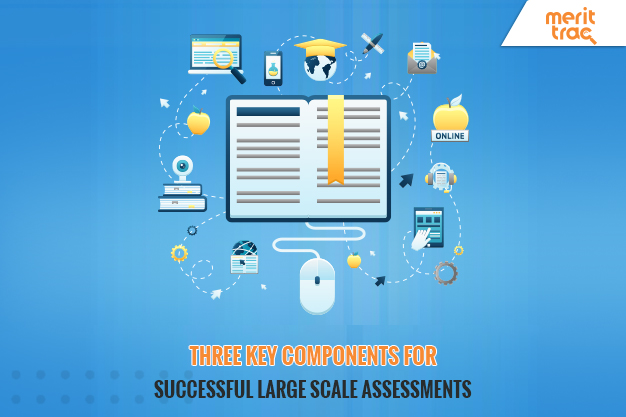
Three Key Components for Successful Large Scale Assessments
Date: 05/09/2018 | Posted by: MeritTrac | Category: Government , Mass Recruitment
With growing digitization, the implementation of large scale assessments in India requires a new focus – one that promotes assessment accountability, reduces time, and raises the quality of testing. The scale of competitive examinations conducted in India for admissions to higher education as well as recruitment is unlike any other in the world. For instance, over 2.8 crore candidates are set to take the online examination for nearly 90,000 jobs offered by the Indian Railways. Given the massive scale, variety and complexity of the exams, conducting glitch-free, high quality assessments is no easy task.
Here are three key components that are critical for the success of large scale assessments:
#1 Assessment framework
An assessment framework is like a roadmap that identifies: how an assessment strategy progresses, the essential content components and likely outcomes, and how to measure the achievement of those outcomes. Deploying an assessment framework boosts the validity of large scale assessments and also enables test developers and evaluators to easily create and fine-tune robust assessment tools. It also helps consolidate learnings and best practices from various large scale assessments to address common challenges, and open up new opportunities for collaboration amongst different organizations. Ideally, an assessment framework must be developed collaboratively with inputs from organizational and institutional stakeholders as well as domain experts and assessment service providers. The Large Scale Assessments Network in India, for instance, serves as a catalyst for driving relevant research for building seamless large scale assessment, across the country.
#2 Technology infrastructure
21st century learning requires a shift from traditional learning measurement methodologies that primarily use multiple choice question (MCQ) formats and assess only a subset of relevant skills. Digital technologies can help capture test data on varied parameters to understand students’/candidates’ problem-solving capabilities by capturing task actions in addition to the usual test responses. The Indian government’s Revitalizing Infrastructure and Systems in Education (RISE) scheme will leverage cloud technologies in line with massive open online courses (MOOCs) such as Swayam (for teachers’ training). It will also deploy Virtual and Augmented Reality enabled classrooms to facilitate simulation-based activities. Simulations can be used for formative as well as summative assessments to gauge the student’s/candidates’ applied abilities and not just knowledge of concepts, thereby significantly augmenting the value of assessments.
#3 Security
Large scale assessments pose a significant challenge in terms of ensuring security of test materials, student data, and test submissions. Lack of specific security standards lead to manual discrepancies or/and misconduct of information related to test material or test takers. India’s examination system has come under the microscope after numerous high profile cheating instances. 2.8 million students faced re-examination after higher secondary test papers in two subjects were leaked on WhatsApp, minutes before the exam, earlier this year.
In order to avoid such security breaches, certain security standards must be set by the assessment teams, recommends the Rashtriya Madhyamik Shiksha Abhiyan Technical Cooperation Agency (RMSA-TCA). All the participants involved in the assessment program and data analysis must follow these standards and ensure that the test material is kept secured and confidential throughout the process. Digitizing large scale assessments using encrypted test papers and restricted access can help bake security right into test design, enabling end-to-end security across the testing cycle.
On the road to assessment innovation
Administering large scale assessments that operate within internationally accepted common frameworks such as the Program for International Student Assessment (PISA) can help further enhance the assessment process. Standardized assessments help governments, educational leaders and hiring managers, better analyze student and candidate performance, identify gaps, and leverage best practices to drive assessment innovation for superior outcomes.
Source:
- timesofindia.indiatimes.com
- centralsquarefoundation.org
- economictimes.indiatimes.com
- theguardian.com
- rmsaindia.gov.in
- rd.acer.org












 Sales Hotline: USA: +1 646 916 0939 / Others: +91 80619 14700
Sales Hotline: USA: +1 646 916 0939 / Others: +91 80619 14700


